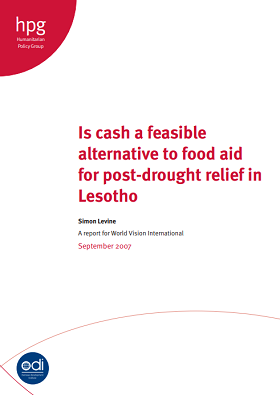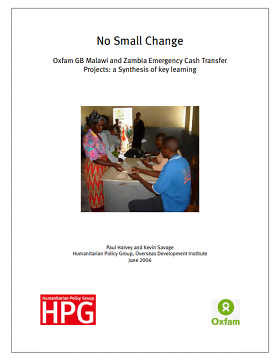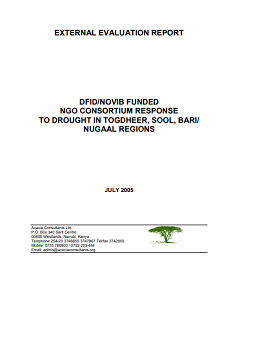شرق وجنوب أفريقيا
تواصلوا مع الفريق
All news and events
نتائج 361 من 368 – 368

Is cash a feasible alternative to food aid for post-drought relief in Lesotho
Case Study
This report summarises the findings from a study undertaken to assess whether or not a cash based response by World Vision to the current drought in Lesotho would be an appropriate and feasible response. It looks at the potential problems which could affect the feasibility of cash interventions and...

No small change: Oxfam GB Malawi and Zambia emergency cash transfer projects: A synthesis of key learning
Case Study
This learning document uses Oxfam GB’s experience of emergency cash transfer programming in Malawi and Zambia to draw out some important lessons in using cash. It examines the two programmes and the findings of the evaluations and asks the question, “Is cash more cost-effective than food aid?”...

Independent Evaluation of Oxfam GB Malawi’s Emergency Cash – Transfer Programme
Case Study
Poor rainfall in Malawi in the 2004/2005 growing season resulted in significantly reduced cereal and non-cereal food production in the country, leaving up to 4 million people in need of assistance. In response, Oxfam planned a programme in southern Malawi, which included a ‘pilot’ cash-transfer...

DFID/NOVIB Funded NGO Consortium Response to Drought in Togdheer, Sool, Bari/ Nugaal Regions
Case Study
This is a summary of the June 2005 evaluation of the NGO Consortium response to drought in Togdheeer, Sool, Sanaag and Bari/ Nugaal in Somaliland. The consortium response to drought was meant to provide cash to targeted drought-affected households to help them meet their basic needs. Important among the...

Evaluation of OFDA Cash for Relief Intervention in Ethiopia: Final Report
Report
As a result of insufficient rainfall in 2002 and 2003, the Ethiopian Disaster Prevention and Preparedness Commission (DPPC) issued an international appeal for food assistance in December 2003. Some 7.2 million people were estimated to be at risk in 2004. An OFDA/DART’s response to this crisis resulted...

Seed vouchers and fairs: A manual for seed-based agricultural recovery in Africa
Guidelines and Tools
This manual describes a new (2002) approach to post-emergency seed distribution in Africa, where farmers receive not free seed but vouchers that can be exchanged for seed at a specially organized seed fair. Seed fairs rely on commercial seed firms (where they are in operation), as well as local seed...

Cash Transfers in Emergencies: Evaluating Benefits and Assessing Risks
Report
In terms of both theory and practice, there appears to be a strong case for cash-based responses to food emergencies where the supply and market conditions are appropriate. Amartya Sen’s work on entitlements offers a solid theoretical base for cash transfers, and the practical experience so far, limited...

Walking the Talk Presentation to the Zimbabwe CTWG May 2011
Presentation
Presentation accompanying the report ‘Walking the Talk – the Impacts of Cash Transfers on Gender Relations’ commissioned by Oxfam & Concern.




